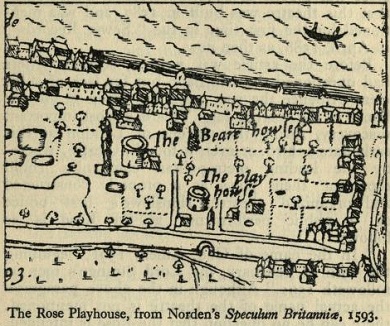| directory |
| home | contact |
|
|||||||||||||||
| search | |||||||||||||||
Shakespeare's Theatres: The RoseThe Rose was built by dyer and businessman Philip Henslowe in 1587. Henslowe, an important man of the day, had many impressive titles, including Groom of the Chamber to Queen Elizabeth from the early 1590s, Gentleman Sewer to James I from 1603, and churchwarden and elected vestryman for St. Saviour's Parish from 1608. Henslowe built the Rose above an old rose garden on the Bankside near the south shore of the Thames, in Surrey. The Rose property consisted of a plot lying on the corner of Maiden Lane and Rose Alley -- an alley about 400 feet long, "leadinge [south] from the Ryver of thames into the saide parcell of grownde," according to Henslowe's own papers. By the time Henslowe acquired the land lease and began drawing up plans for the Rose, professional playhouses like the Theatre, and the Curtain had been open for over a decade. Realizing the ease with which audiences could ferry across the Thames to London's South Bank, Henslowe desired to establish a playhouse in that particular location, already familiar to Henslowe's contemporaries as an area saturated with sundry and sometimes infamous pastymes such as bear-baitings, bull-baitings, and brothels.The Rose was round and elegant, solidly composed of brick and timber, and easily accessible, making it more sophisticated than the Theatre. After 1592, the Rose seems to have become very popular, and many acting companies performed on its stage, including Lord Strange's Men (probably including Shakespeare as an actor) from 1592 to 1593, Sussex's Men from 1593 to 1594, the Queen's Men in 1594, the Admiral's Men (Shakespeare's chief rivals, who performed in the Rose for seven years starting in the spring of 1594), and Worcester's Men as late as 1603. During the plague of 1593, the Rose closed down for a time, and nearly 11,000 Londoners succumbed. It appears that actors from Lord Strange's Men were among those that perished because, when the Rose did reopen, Sussex's Men opened in their place. What happened to Shakespeare at this time is an enigma; however, he might have been making plans to move across the river and join Heminges at the Theatre. The Rose had many successful years, standing the lone, majestic playhouse on the Bankside. But others wished to share in Henslowe's success and new theatres were built beside the Rose, contributing to its ultimate demise. The land lease Henslowe had secured some thirty-one years before, expired in 1605. Records show that Henslowe, although suffering financially due to the competing playhouses (primarily the Globe), was ready to renew his lease under the original terms, but the parish from which he was renting insisted on renegotiating the contract, tripling his rent, and demanding 100 marks toward the upkeep of the parish. Henslowe was livid and replied to the parish, exclaiming that he 'wold [r]ather pulledowne the playehowse then . . . do so." Henslowe gave up the Rose in 1605, and it is assumed that it was torn down the following year. Henslowe went on to build the Hope Theatre in 1613, and he died in 1616. How to cite this article: References Berry, Herbert, ed. The First Public Playhouse. Queen's University Press: Montreal, 1979. Boyce, Charles. Shakespeare A to Z. Facts on File: New York, 1990. Rutter, Carol Chillington. Documents of the Rose Playhouse. Manchester University Press: Manchester, 1984. ______ Related Articles |

|
©1999-2021 Shakespeare Online. All Rights Reserved.